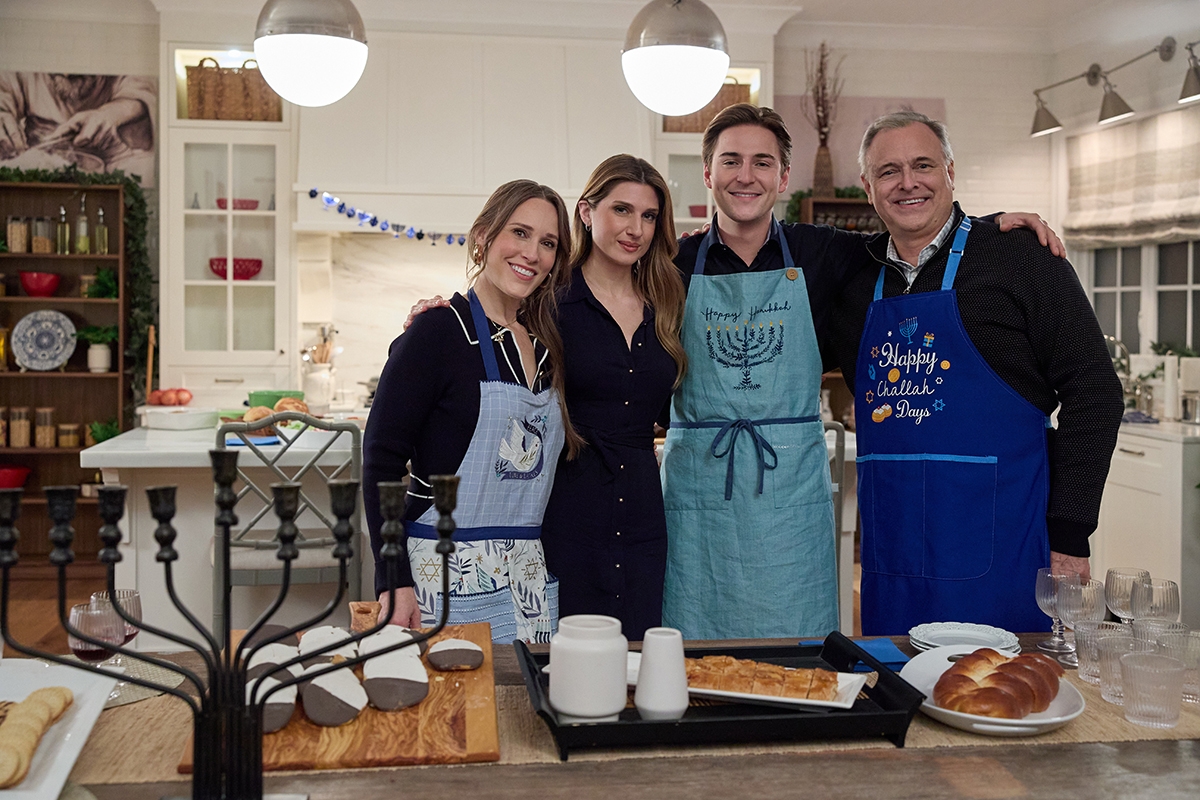In Hallmark’s new holiday movie “Leah’s Perfect Gift,” Leah’s boyfriend Graham (Evan Broderick) prepares latkes with her dad while wearing a Hanukkah apron as Leah calls him a “mensch.” The sputtering oil sets off the smoke detector and her mom cries, “Latkes aren’t really latkes if they don’t set up the smoke detector,” which is both true and a quote that Leah jokingly attributes to the ancient Jewish sage Maimonides. There’s a Hanukkah candle lighting scene complete with Hebrew blessings; there’s competitive dreidel spinning. And Leah’s mom hunts everyone down to make sure they’re not leaving without leftovers.
And yet it doesn’t feel quite right to call the film, which stars “Nobody Wants This” actress Emily Arlook, a Hanukkah movie. Instead, I’d call it a Jewish Christmas movie — and as far as Jewish Christmas movies go, it’s maybe the best one ever made.
“Leah’s Perfect Gift” is based on a holiday novella by Catherine Beck called “Leah’s Perfect Christmas.” Arlook plays an accomplished Jewish woman, just like her character in Netflix’s “Nobody Wants This,” the “crazy” ex-girlfriend of Rabbi Noah Roklov. Yet in this movie, there are no crazy Jewish girlfriends (just a bit of an over-doting Jewish mom, who is really quite likable). And our Jewish protagonist, Leah? She is the personification of a bright ray of sunshine. Arlook plays a Jewish protagonist brimming with joy, Jewish and otherwise, and the Jewish actress makes for the perfect Hallmark heroine.
Like many a Jewish person in America, even the grinchy writer of this piece, Leah finds aspects of Christmas enchanting. She loves the lights, the decorations, the brisk air. When Graham invites her to his family’s celebration, she is absolutely stoked to spend her first Christmas not as an outsider but as someone inside that magic.
“Hanukkah isn’t enough for you anymore?” her cousin Sarah (Bree Woodill) grudgingly asks at the family Hanukkah party, to which Leah emphatically replies that she’s not converting, she just wants to see Christmas like “it is in the movies.”
“‘White Christmas’ does paint a pretty picture,” Sarah concedes.
The reference is spot on, given that the song “White Christmas” was written by the very Jewish Irving Berlin. Thus, wittingly or unwittingly, the movie offers a reminder of how many Jewish songwriters were part of making American Christmas magical for their non-Jewish neighbors. Jews and Christmas magic, we’ve got a real connection. Heck, the biggest Hallmark Christmas movie of the season, “Holiday Touchdown: A Chiefs Love Story,” not only stars Jewish actress Hunter King, but was written by the Jewish writer of “Hanukkah on Rye” and the upcoming “Hanukkah on the Rocks.” There’s a reason why the Jewish protagonist of Jean Meltzer’s romance novel “The Matzah Ball” is secretly the writer of Christmas romances.
Yet when Leah goes to visit Graham’s family, it turns out that the Christmas magic isn’t all that magical in real life. Enter Graham’s control freak mom Barbara, played by Hallmark Christmas movie veteran Barbara Niven. She has a whole program and a very clear picture of what the family Christmas needs to look like, with organized competitions, formal attire and a very full itinerary, and Leah struggles to fit in. Drama also ensues with Graham’s ex, whose family Barbara is very close with. It’s “Nightmare Before Christmas” than “White Christmas,” more Christmas oy than Christmas joy (sorry, the cheesy pun felt right for a piece about Hallmark romances).
There is so much to love and to make a Jewish person feel seen in the film. Leah experiences real culture shock when she realizes Graham’s family, unlike hers, doesn’t have a nosh on hand at all times. Leah is super close with her cousin and keeps calling her for emotional support amidst the bewilderment. And her parents embrace Graham completely, giving him a place of honor in their holiday celebrations (nobody calls him a shiksa, sheygetz or goy!).
Then there’s the beauty of seeing Graham and Leah, an interfaith couple, lighting the menorah together on the last night of Hanukkah. Graham is genuinely thrilled to perform this domestic Jewish ritual together. When Graham wonders why Leah has to pick up challah for a Hanukkah celebration, she jokes that “every Jewish holiday is kind of about everything, except for Yom Kippur, which is about nothing, then everything.” The Hanukkah party is full of Jewish food and joyful banter. Leah’s dad calls shredding the potatoes in the food processor “cheating” and even has a very silly secret to making the perfect latkes.
I don’t want to spoil the movie itself for those of you planning to watch — and I really highly recommend watching — but I will say that “Leah’s Perfect Gift” also incorporates a fully American Jewish Christmas tradition. I’m talking, of course, about the Christmas Day feast at a Chinese restaurant, a tradition that began decades ago in the Lower East of Manhattan and is an integral part of the Jewish American experience. It adds that final seal of authenticity to a movie that feels both like a very thrilling Hallmark romance and a real reflection of someone’s Jewish experience in this country.
A big critique of “Nobody Wants This” is that it portrays Jewish women in a negative light, and while I personally loved the complexity and fierceness of both Esther (Jackie Tohn) and Rebecca (Arlook), I do see how their portrayal as overbearing and not as fun as their gentile counterparts is painful. I love that in this movie, Arlook’s Leah Goldberg is the opposite of that, a Jewish woman who is funny and fun and has a big personality, but also brings the light of a thousand menorahs to Graham’s family. And even more than that, I love the joyous interfaith representation, showing that for Graham and Leah, sharing each other’s tradition is, well, the perfect gift.








